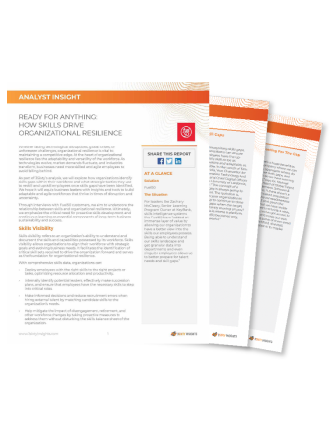Today, more than ever, offering opportunities for talent development is critical to engaging and retaining productive and high-performing employees. And mentoring and coaching have a critical part to play in that.
As a well-known business publication put it, “Mentorship comes in many flavors … (especially) in light of a changing, more purpose-driven, more tech-enabled work environment.”
Both mentoring and coaching offer incredibly valuable developmental support. They are invaluable tools to help develop your people in the long term – and support them on their career path and with personal and professional goals, too.
If you are seeking some actionable insights into good coaching, you might like to check out our recently published article Leaders Make the Best Coaches – And Investing in Coaching Technology Can Make Them Better Still. Otherwise, let’s dive into what are some of the benefits that a workplace mentorship program can bring.
The benefits of a workplace mentoring program
Mentorship programs are good for employees — but they are REALLY good for your larger company culture.
According to Forbes, “strong and vibrant mentoring programs do two important things — they both provide support for new hires, and also help create an open, inviting culture that drives all workers to contribute their ideas for improving the organization.”
But the benefits go well beyond that. As the Harvard Business Review pointed out:
“Creating a mentoring culture … leads to better retention, more loyalty, and commitment among employees, stronger succession planning, more organic mentoring, and strengthening of resilient developmental networks or mentoring constellations in the workplace. Rather than a single assigned mentor, junior employees are more likely to construct a web of supportive relationships.”
The most impressive thing about an effective mentorship program is the positive and far-reaching ripple effect. Strong mentorship and coaching programs can improve job satisfaction and employee retention. They can also motivate and encourage workers to seek growth experiences to build their careers while working to drive organizational success.

Transform the people experience
Mentorship and coaching programs can help transform the talent experience within organizations.
The Harvard Business Review explained the benefits of a great mentorship program — and how it helps in transforming the people experience — like this:
“Of all the ways you can spend your time, mentoring has one of the highest returns on investment. It enables you to take everything you have learned and ‘pay it forward,’ shaping the next generation of leaders.
As Harvard Business School professor Clay Christensen puts it, “The only metrics that will truly matter to my life are the individuals whom I have been able to help, one by one, to become better people.”
And Hall of Fame college basketball coach John Wooden once said: “Mentoring becomes your true legacy. It is the greatest inheritance you can give to others. It is why you get up every day.”
By coaching the whole person, and not limiting your conversations to career matters, you will have an even greater impact that will be felt by your coachees — and everyone they influence — for years to come.
Understanding and improving the people experience is critical for companies operating in a highly competitive global economy. Providing an engaging talent experience, one with a strong coaching program, will help organizations succeed in attracting and retaining skilled employees and building better employee engagement and better company culture. Not to mention, a strong employee experience can also help to drive a strong customer experience.
Mentoring in the new world of work
Mentorship and coaching programs today involve a much larger cross-section of the workforce than ever before. Coaching is no longer just for the chosen few; it is now a larger and more important management tool to promote a culture of talent development and to provide growth experiences that transform and build people throughout an organization.
Forbes recently made this very point, when they reflected on how mentoring programs have changed — and improved — in our new world of work:
“A generation ago, mentoring was often built into the employer-employee relationship. A boss could be expected to see an employee as their protégé, not only supervising them but helping to steer their career. As that relationship has changed, companies are searching for other ways to create a meaningful connection with their employees. A strong mentoring program is a smart initiative for aligning your employees’ individual purpose with that of your organization. With those two interests in sync, your workplace culture will flourish.”
In a recent example of success, RTI International recognized that talent is their number one asset. They were looking for a solution that provided both a mentoring application and something that would help leaders with career conversations. As stated by Laura Peterson, Vice President of Global Talent and Organization Development at RTI International:
“With a highly intellectual organization, we don’t need more L&D… we need more connectivity.”
After conducting extensive research on what mentoring should look like and how it could enhance and spread their employee growth and development experience, RTI International chose to launch “Develop & Grow” – their enterprise-level learning and development (L&D) vision & strategy. During a metrics review of their efforts, they discovered that their mentor relationships across the business had increased from 92 to 128 in just nine months and that 70.2% of users were satisfied with the new career experience.

Although job satisfaction and better employee retention are the most obvious benefits of a mentorship program, mentoring can support the personal and professional development of the mentees too — the very employees who are involved in it.
That’s a critical part of it, of course, but it’s that last point Forbes makes that bears repeating — “A strong mentoring program is a smart initiative for aligning your employees’ individual purpose with that of your organization.”
Building a company culture has never been more challenging than it is today. With so many employees working remotely, often without regular personal contact with their managers and peers, it can be hard to build a positive and thriving culture.
That’s why it is important now to remember the value of a strong mentorship program. Coaching can truly help connect people with others across the organization, as well as connect the personal goals of employees with those larger, critical company goals.
“With those two interests in sync, your workplace culture will flourish,” Forbes noted, and they are totally right. In the end, THAT is what a great mentoring and coaching program is all about.
Enable your leaders to become world-class career coaches
Internal coaching marketplaces are becoming a critical part of an organization’s employee experience, and they allow everyone and anyone to be a stretch coach. By providing access to internal coaching in this way, and not just for leaders but for everyone, you can create a true learning culture that is completely enabled by your staff — the most democratized approach to learning yet.











